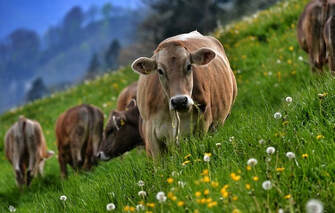
While the trend these days is towards a meatless diet, the fact is that meat substitutes are often almost as bad for the environment as industrial farming (remember that vast monocultures of corn and soy - which often replace meats in meat substitutes - are terrible for the environment). And even if they weren't, removing animals entirely from the farming equation usually means relying on inputs of chemical-based fertilizers that deplete the soil and pollute the air and waterways.
So what is the answer? In this video podcast episode, Dr. Mark Hyman talks with land stewards, ranchers, and regeneratively-raised meat company owners, Robby Sansom and Taylor Collins, about the nuances of regeneratively-raised meat and how it can reverse climate change, support better health for those who eat it, and provide more natural and caring conditions for the animals it involves.
Join us for an eye-opening episode that challenges the conventional narrative surrounding climate change and meat consumption!
Our current food system in the United States heavily favors the production of corn and soy, granting advantages to large-scale farms while leaving smaller ones struggling to survive. Robby shares his insights gained from studying regenerative agriculture across various ranches worldwide, shedding light on its fundamental differences from conventional and organic farming practices.
As they dive deeper into the conversation, they confront our growing detachment from food production and the concept of death, particularly concerning meat consumption. A firsthand experience at ROAM Ranch during a Bison harvest led to profound reflections on the importance of honoring the lives of the animals we consume. Taylor explains how the treatment and manner of an animal's death are equally crucial as its living conditions. Additionally, he highlights the nutritional disparities between regeneratively grown bison and conventionally raised cattle.
Vast areas of farmland in the U.S. have suffered systematic depletion and loss of nutrient-rich topsoil due to intensive agricultural practices. This dialogue explores the critical role of animal integration in regenerative agriculture, emphasizing how different animals contribute to the overall health of the land through grazing practices.
Delving into the true cost of food, they expose the multifaceted impacts that extend far beyond financial considerations. Loss of biodiversity resulting from conventional farming practices has severe implications for our food security, with declining soil fertility and decreased pollinator populations essential for food production.
Discover how regenerative agriculture presents a viable solution to achieve not only better food and a cleaner environment but also improved overall health for individuals and communities! Tune in for this enlightening discussion on reshaping our food system and combating climate change through regeneratively raised meat:
- The big-picture issues with our food system (7:48 )
- Regenerative agriculture as a solution to these issues (11:23)
- How the food industry takes advantage of consumers (13:21)
- The true cost of corn (19:41)
- My visit to Roam Ranch (23:55 )
- The nutritional value of regenerative bison vs feedlot beef (42:32)
- Lessons from a regenerative rancher (45:15)
- Six principles of soil health (54:41)
- Food production around the world (1:01:51)
- Is regenerative agriculture scalable on a global level? (1:05:47 )
After you watch it, I'd love to hear your thoughts! Is it possible to raise food sustainably without animals? Comment below, or share with the community on our Facebook page.
Rose.



 RSS Feed
RSS Feed